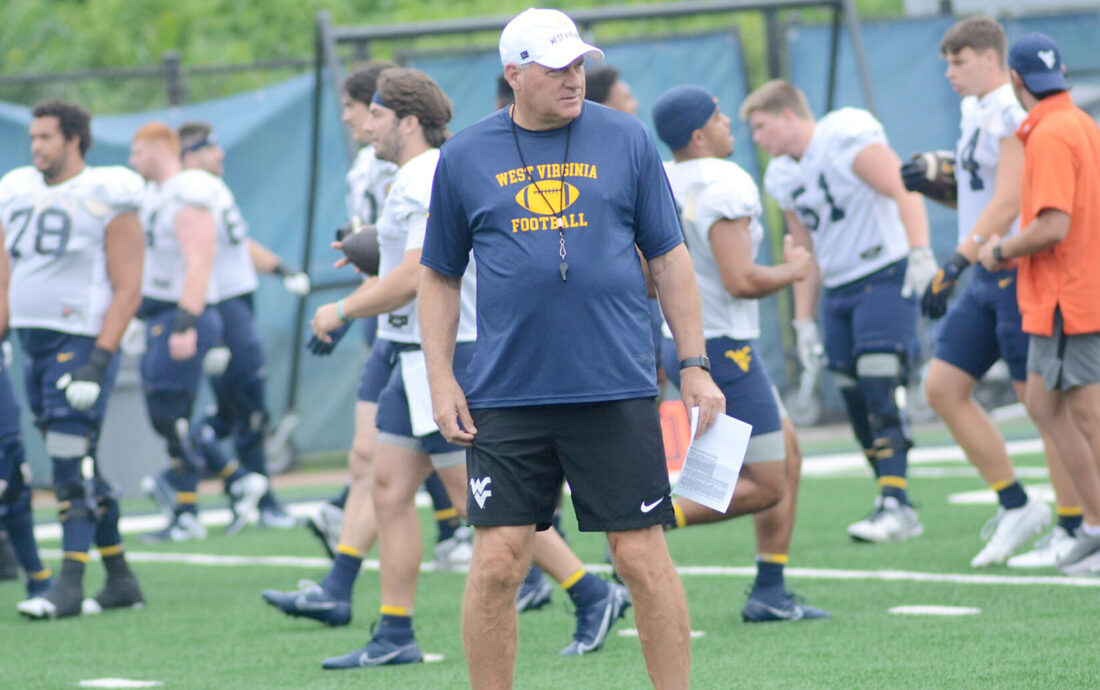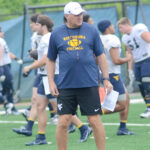Raising the Intensity
Mountaineer gridders hold first day of contact drills

Photo by BlueGoldNews.com WVU coach Rich Rodriguez watches a drill during practice.
MORGANTOWN — It was the first day of pads for the new football season at West Virginia, a moment that had been eagerly anticipated by all 115 or so of the players involved, for football in shells and without any real contact or tackling is not really football at all.
Players, you see, expect their English 101 class or Psych lab to be non-contact, but football without contact is like a rock concert without amps or a fraternity party with only non-alcoholic beer to drink.
Rich Rodriguez, like his players, had eagerly awaited the first contact practice, too. There’s something in the sound of football collisions to a coach that is the like sound of a 747’s engine roaring down the runway after a 5-hour delay to a passenger.
He was enjoying it, even if the first day of contact was limited to about 20 or 25 minutes and didn’t yet involve the quarterbacks going live, something that is scheduled to be introduced on Wednesday which will allow the coaches to see who responds best when the action is live.
“We did about 20 or 25 minutes of live tackling, which should bring a certain level of intensity or level of true football, so I probably would have gone a little bit longer with it, but then I got mad at something and just made them run for 10 or 15 minutes,” Rodriguez admitted.
And that was how practice ended.
It was pure Rodriguez at his coaching best. Things weren’t terrible, but whatever it was that caused the whistle hanging around his neck to tighten like a noose was enough to put an end to what probably should have been a far better afternoon of football.
When asked to explain, Rodriguez offered up this analysis of the day.
“It wasn’t why I called it off at the end, but there were way too many moments of softness,” Rodriguez said, using a version of one of only two four-letter words banned at his camp — soft.
The other, by the way, is lazy.
“It isn’t everyone all the time and it’s not the same guy all the time, but it just can’t be allowed,” Rodriguez explained. “I think sometimes our guys don’t even realize they are being soft. I don’t want to say it’s in their DNA, it’s just that their version of going hard and ours hasn’t quite measured up all the time.”
At this point, perhaps, an explanation of what being “soft” really means. Is it not hitting hard, a lack of tempo, bad technique?
“All of the above,” was the answer Rodriguez chose from this multiple choice test.
“Going hard, being physical. I mean, we’re not tackling low, we’re not cut-blocking low. Everything’s up high. I don’t want cheap shots. The guys understand that,” Rodriguez said.
But they aren’t playing patty-cake either.
“There should be some collisions and sounds of collisions,” Rodriguez went on. “And, up front, the O-line and D-line, it looks like they’re tango dancing instead of playing football. I didn’t eat a big breakfast and that’s good because there’s things that might make you lose your breakfast.”
And so, rather than let things get worse, Rodriguez just called it a day.
An inquiring media mind wanted to know if there was anything Rodriguez could do to bring out the aggressiveness as it was happening.
“You mean other than yell,” he said, laughing about it. “I don’t think you always have to yell, although I do because that’s the way I coach. Other coaches have to coach to their personality. There’s not one way to coach. I’m kind of loud. Other coaches are more cerebral.
“That’s fine, whatever you have to do to get results. I wasn’t like yelling the whole practice but there are some moments when I almost have to overemphasize things so all the players at that position understand it. Guys understand, we can’t make the same mistakes tomorrow that we did today.
“Some of the things that are egregious — in a football sense, not a life sense — you have to make a point out of because everyone has to make a point out of. If you don’t run the route right because you are lazy or don’t do a particular technique in that route because you are lazy, that is a different type of dynamic that must be corrected.”
To Rodriguez, these are mental errors.
“Either you don’t know what you’re doing — and that’s usually not the case — or you’re too lazy to do it the right way. Typically, what I get upset with is when they take the easy way out. We said earlier, everything now is made to be easier, so unfortunately sometimes they take that to the football field.”
Rodriguez is from a different generation.
In his era playing at WVU under Don Nehlen in the summer you would have two-a-day or even three-a-day practices, something that now is outlawed.
“You know then, guys didn’t pull a lot of muscles because they were in shape,” he said. “I remember we walked six times to or from the Towers dormitory in three-a-days. We didn’t need cars because we were in shape. I would’ve taken a ride, but we weren’t allowed to.
“I’m not one of those guys who talks about how hard it was in the old days. These guys work hard and we have a great training staff. Our guys have a great work ethic, but our job as coaches is to push them to up that,” Rodriguez said. “I give a shoutout to Pat McAfee. He’s one of my guys and he’s hugely successful in everything he does but he works his tail off now. Seven days a week, all over the country … he’s earned his success and I think some of that mentality from here.”
However, you know a ‘but’ is coming here.
“I do think it’s more commonplace to think about more than football,” Rodriguez went on. “During summer camp there should be nothing other than football on their mind. I don’t know what they are doing but they’re probably watching someone in their tights dance on TikTok or watching SpongeBob SquarePants or playing video games.”
Rodriguez knows that tomorrow’s another day and as time goes on it will get better.
Or?
“People say I like to yell,” he said. “No, I like to win.”

